
April 2, 2025


| “I just find out what kind of a game they’re looking for, and try to take them to the non-electronic version.” — Rebecca Pfeil, Timeless Toys |
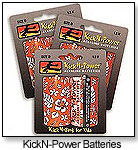 “We don't carry a lot of things that require batteries. The defective rates happen to be a lot higher than things that don’t,” said Michael Temke, buyer for Wind Up Here in Olympia, Wash., of the quality concerns steering him toward classic reliability.
“We don't carry a lot of things that require batteries. The defective rates happen to be a lot higher than things that don’t,” said Michael Temke, buyer for Wind Up Here in Olympia, Wash., of the quality concerns steering him toward classic reliability. 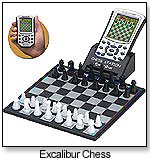 1. Start a Conversation. Find out why the customer is looking for that particular item for the child, and guide them toward products tailored to their interests. “We ask questions about what they're looking for and what the child likes to do. Then we make recommendations,” said Cathy Albro, owner of Creative Learning Toys in Grand Rapids, Mich.
1. Start a Conversation. Find out why the customer is looking for that particular item for the child, and guide them toward products tailored to their interests. “We ask questions about what they're looking for and what the child likes to do. Then we make recommendations,” said Cathy Albro, owner of Creative Learning Toys in Grand Rapids, Mich.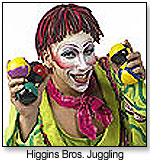 3. Substitute Active Play. Recommend “a ‘doing’ sort of thing, like lots of different juggling, arts and active [toys],” suggested Tina Schwindt, owner of Fairhaven Toy Garden in Bellingham, Wash. “Not necessarily outdoor, but something that they can use their hands with.”
3. Substitute Active Play. Recommend “a ‘doing’ sort of thing, like lots of different juggling, arts and active [toys],” suggested Tina Schwindt, owner of Fairhaven Toy Garden in Bellingham, Wash. “Not necessarily outdoor, but something that they can use their hands with.”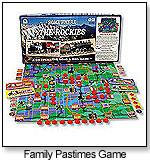 5. Find Interaction. “We recommend toys where the kid’s in charge of the play instead of the toy being in charge,” said Mary Sisson, owner of Kazoodles in Vancouver, Wash. “We try to find alternatives that will exercise kids’ brains or bodies or whatever seems to fit the bill.”
5. Find Interaction. “We recommend toys where the kid’s in charge of the play instead of the toy being in charge,” said Mary Sisson, owner of Kazoodles in Vancouver, Wash. “We try to find alternatives that will exercise kids’ brains or bodies or whatever seems to fit the bill.” 36 Cube by THINKFUN Quadrillions of possibilities, 36 Cube seems simple, but is stunningly complex. The directions sound simple: build a perfect cube by arranging the towers so each color is represented only once in every row and column - all while making sure the top remains level. It's a tall order, but it's one that brings hours upon hours of addictive fun. Strikingly colorful construction begs to be displayed. And although it's difficult to solve 36 Cube completely, the fun is working to improve each time it's played. That's part of the game's mystique: initially, you believe you can't solve it. Until you discover that you can. Launch date: November 17, 2008. 1/9/2009 (MSRP: $24.99; Age: 8 and Up)
Quadrillions of possibilities, 36 Cube seems simple, but is stunningly complex. The directions sound simple: build a perfect cube by arranging the towers so each color is represented only once in every row and column - all while making sure the top remains level. It's a tall order, but it's one that brings hours upon hours of addictive fun. Strikingly colorful construction begs to be displayed. And although it's difficult to solve 36 Cube completely, the fun is working to improve each time it's played. That's part of the game's mystique: initially, you believe you can't solve it. Until you discover that you can. Launch date: November 17, 2008. 1/9/2009 (MSRP: $24.99; Age: 8 and Up)
DeLuxe Snap Rover SCROV-50 by ELENCO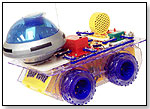 With this deluxe version, kids can build their own RC Snap Rover using the colorful Snap Circuits parts that come with the kit. There is no soldering required; all the parts simply snap together with ease. Once the Snap Rover is completed, kids can navigate their surroundings with the easy-to-use remote control. The Deluxe features a disc shooter, a digital voice recorder, music sounds, a wireless microphone and more than 20 other experiments.
With this deluxe version, kids can build their own RC Snap Rover using the colorful Snap Circuits parts that come with the kit. There is no soldering required; all the parts simply snap together with ease. Once the Snap Rover is completed, kids can navigate their surroundings with the easy-to-use remote control. The Deluxe features a disc shooter, a digital voice recorder, music sounds, a wireless microphone and more than 20 other experiments.
— "The Deluxe Snap Rover comes with remote control and can be navigated both forward and backward. It all snaps together with ease and comes with a full assembly manual,” said Walter Larsen, national sales manager for Elenco. 9/6/2007 (MSRP: $99.95; Age: 8 and Up)
20Q Junior by RADICA GAMES This game is a friendlier version of the classic 20 questions game, created with younger children in mind. The game itself features simplified questions and answers and is built to better fit in small hands. To play, kids simply think of an object and then answer a series of 20 questions about the object. 20Q Junior is programmed to engage in child-friendly banter and enthusiastic encouragement. Kids can use color-illustrated and themed picture cards to help them identify an object. 6/29/2007 (MSRP: $19.99; Age: 5 and Up)
This game is a friendlier version of the classic 20 questions game, created with younger children in mind. The game itself features simplified questions and answers and is built to better fit in small hands. To play, kids simply think of an object and then answer a series of 20 questions about the object. 20Q Junior is programmed to engage in child-friendly banter and enthusiastic encouragement. Kids can use color-illustrated and themed picture cards to help them identify an object. 6/29/2007 (MSRP: $19.99; Age: 5 and Up)
Copyright © 2025 TDmonthly®, a division of TOYDIRECTORY.com®,
Inc.